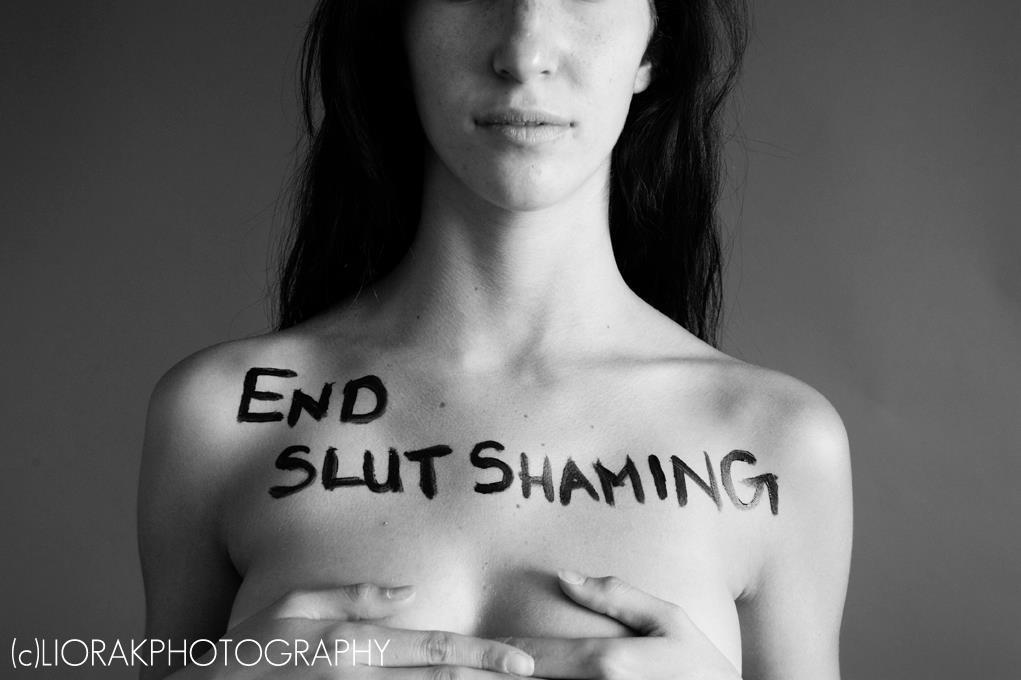So, what is slut-shaming?
Slut-shaming is defined as “the act of making, or attempting to make, a person, especially a woman or girl, feel guilty or inferior for certain sexual behaviors, circumstances, or desires that deviate from traditional or orthodox gender expectations, or that which may be considered to be contrary to natural or religious law.”
First, I’d like to acknowledge that people should be in control of their own emotions and feelings, and I like to quote Eleanor Roosevelt on this: “No one can make you feel inferior without your consent”. However, our lives and our emotions do not exist in a vacuum. Large cultural assumptions and pressures do impact how we may perceive ourselves and how we are perceived by others. Shaming isn’t just an internal “I feel shame”, but the expectation by others that you should feel shame, even when you don’t, or even that others (friends, family, partners) should be ashamed of you.
The reasons for slut-shaming are varied and complex. Many of the justifications for doing so claim there is some objective standard by which women’s sexuality can be judged. It is rooted in a notion that women’s inherent value may diminish through sexual activity – perhaps a lot of it or with numerous partners. There are those who think women lose something by engaging in sexual activity. What exactly, I can’t tell.
Now, once upon a time, sex was rather dangerous for women. A woman who had sex before the advent of safe and easy birth control (and abortion) risked pregnancy and parenthood with each sexual encounter. This naturally created a motivation for women to protect themselves from sexual activity, at least until the situation or partner was preferable for taking on that risk. In a more primitive and less free era in human history, where women were heavily dependent upon men for resources, sex and the result of that sexual activity was certainly perceived by many as a bargaining chip, and thus there was value assigned to it.
Fifty years ago this week, the Supreme Court ruled that it was unconstitutional for government to prohibit married couples from using birth control. Seven years later, the Supreme Court ruled the same for unmarried individuals, and the following year was the Roe v. Wade decision on abortion.
We women are no longer restrained by biology. This is a good thing, because it allows us incredible liberty and control over our own lives. We can decide when to become parents (if ever).
Though pregnancy risk still exists, and sexually transmitted infections are unpleasant at best and deadly at worst, women have power over their reproductive abilities, and thus the reasons for “protecting” one’s sexuality are now simply based in bodily autonomy: what a woman wants to do with her own body. (For a critique on the risk of parenthood taken on by men, read this other article of mine.)
In certain circles, you’ll hear people say that the purpose for men caring about women’s sexual activity has natural, “evolutionary” roots, to ensure paternity, and not “end up” responsible for raising another man’s child. Whatever my opinion of that as a general concept, it should no longer be a relevant concern in a world where we have birth control and paternity testing. Just because something is “natural” or “traditional” or potentially a product of one particular stage of one particular time period in our evolution does not make us beholden to it – as logical, thinking beings, we are better than that. The point is not to limit ourselves by spurious pseudo-biological claims and reductionism.
To be clear, preference is subjective value, and if a man happens to value a virgin or a woman with less sexual partners, he’s certainly got the right to make up arbitrary preferences of any kind, much like women do about men. But that judgement is neither objective nor universally applicable. Slut-shaming is still not the solution to this particular preference.
Feminists do it too.
 Let’s be clear about one thing – slut-shaming isn’t only a man-on-woman action. Women have been known to shame other women for their sexuality, for many reasons.
Let’s be clear about one thing – slut-shaming isn’t only a man-on-woman action. Women have been known to shame other women for their sexuality, for many reasons.
What bothers me especially is when feminists do it. They do it in numerous ways, from accusing other women of catering to the “male gaze” to making assertions that women lose something through sexual activity.
I find this especially alarming when it comes to discussions of sex and consent. Now, recognizing and setting aside that getting women drunk for the purposes of raping them is actually a real thing that must be condemned, let’s take a moment to talk about a common situation: A man and woman are at a bar, both reasonably drunk, and they decide to have sex. The next morning, those two individuals may have any number of individual emotional reactions to their sexual activity (or none at all), but it seems that everybody else has an opinion about that sexual activity. The reactions towards the man and the woman will inevitably be different.
Increasingly, I’ve heard feminists tell me that there is no way to consent while consuming alcohol at all. I’ve told silly drunk hookup stories to friends and heard them actually say “don’t you think you were raped?”. Why do they say that? Why must my actions be constantly scrutinized and policed by my allies? Because I had sex while drunk? Because they wouldn’t have done what I did? I think trying to find a victim here is a dangerous game to play, and I see it happen all the time. I am constantly inundated with social messages questioning my agency and ability. From fellow feminists.
Excuse me, friends, but what part of not losing any value as a human being through sexual activity do you not grok? I take such issue with this, because for all my consideration of thoughtful sex-critical discussions, there’s still a sex negativity that happens within feminist spheres that I find dangerous and slut-shaming. The paternalism of some feminist allies indicating that all sex workers are victims is yet another one of those cases, and something I can’t get behind. Of course sex trafficking is a problem, but the solution to that is decriminalization or legalization, so you can separate the consensual sex work from the non-consensual kind. I have the audacity to suggest liberty in commerce might be able to sort this out.
Much like my previous article about women needing to advocate better for themselves regarding “manspreading” this is another situation where I feel the well-meaning advice of some advocates is actually reducing women’s equality and agency, by suggesting we don’t have the ability to make up our own minds and be responsible for our own actions.
Sex does not need to be something to be ashamed of. It doesn’t need to hurt, it doesn’t need to meaningful or meaningless. It’s just sex. Sex is not inherently bad. Not for men, not for women, or for any of the variety of non-binary distinctions of gender. We don’t need to be protected from the act of sex itself. Rape is certainly bad, and regrettable sex is, well, regrettable — but it’s not rape.
This is one of those crazy places where some radical, or sometimes even mainstream-but-hysterical feminists and some men’s rights activists seem to come together: they both see sex as inherently bad for women. Which is a disgusting perspective, in this author’s humble opinion.
It enables rape.
Seriously. Besides the fact that slut-shaming causes people to act as if victims of rape somehow deserved or asked for it, there’s also the issue of enabling rape through disabling the agency of women. Many women have been taught socially that they’re not allowed to want sex. This causes women who do want sex, but are aware of the social consequences, to involve themselves in games of “hard to get”, where they say “no” while meaning “yes” or “chase me”.
As a woman who was raised out of the mainstream social sphere and has never felt shame for sexual desire and who articulates exactly what she wants to intended partners, this pisses me off more than I can explain. When I say “no” I actually mean “no”, and a man who continues to try to “convince” me or change my mind is being tremendously disrespectful to me. I know what I want, I know how to articulate what I want, and thinking I do not is presumptuous.
I recognize that this problem comes from men and women. Generations of women saying “no” when they really meant “yes” have messed up communication between the genders – and it causes those of us who utilize our agency to determine our preferences to find ourselves fending off men who don’t seem to understand the basic concept that no means no.
The social expectations that women are not “allowed” to want sex or numerous sexual partners cause women to have to hide their actual desires, blurring the lines of consent and creating poor communication in a time when we really could use better communication.
It also means that a man doesn’t actually know when a “no” is really a no, and so bold moves can either be greatly rewarded if he reads correctly on the right person, or he could end up in prison.
It makes real rape victims feel worthless.
In an interview in 2013, Elizabeth Smart discussed her kidnapping, rape and continued imprisonment at the age of 14. She had been raised in a deeply religious conservative home and had experienced many lessons about the importance of her sexual purity.
“It’s feelings of self-worth. It’s feeling like, ‘Who would ever want me now? I’m worthless.’ That is what it was for me the first time I was raped.
I was raised in a very religious household, one that taught that sex was something special that only happened between a husband and a wife who loved each other. And that’s how I’d been raised, that’s what I’d always been determined to follow: that when I got married, then and only then would I engage in sex.
After that first rape, I felt crushed. Who could want me now? I felt so dirty and so filthy. I understand so easily all too well why someone wouldn’t run because of that alone.”
Reading Elizabeth Smart’s statements on the subject is sobering and informative, I highly recommend checking out the entire interview.
This “purity” or abstinence-only teaching isn’t exclusively a symptom of religious ideology, however – it occurs in non-religious contexts and public schools, yet another situation where arbitrary morality standards are endorsed by certain sub-cultures or government itself. Let’s be clear: women who have been raped are not “damaged goods”, and suggesting so has real consequences on people’s lives.
It increases false rape claims.
 The number of false rape claims cannot be known accurately, but there are many speculations about the percentages. There are many motivations for falsely claiming rape, and the most common one I hear people throw out is that “she was punishing him for something else”. Setting aside the debate about the level of vindictive behavior of some women, let’s not ignore what is definitely a factor in many false rape claims: slut-shaming.
The number of false rape claims cannot be known accurately, but there are many speculations about the percentages. There are many motivations for falsely claiming rape, and the most common one I hear people throw out is that “she was punishing him for something else”. Setting aside the debate about the level of vindictive behavior of some women, let’s not ignore what is definitely a factor in many false rape claims: slut-shaming.
Related: We Need Harsher Penalties For False Rape Accusers
A society that treats women like they lose something from sexual activity is going to find women defending themselves from that alleged loss by any means: including falsely claiming that sexual activity was neither wanted nor consented to.
A woman has sex, and is slut-shamed for it. This may cause her to feel the need to “protect” her perceived sexual “value” – how best to do that? Claim she didn’t want the sex in the first place. Suddenly, the man’s a rapist.
Don’t tell me this doesn’t happen, because it’s exactly what happened to a male friend of mine. A woman who internalized slut-shaming so much that she frequently called other women sluts and judged them harshly for promiscuous sexual activity, fooled around with someone I know, felt shame for doing so, and to protect her reputation as a virgin and someone who would never allow a man like him to have sexual access to her, claimed he raped her and ruined his life.
This is the result of slut-shaming, a concept that really shouldn’t exist amongst civilized people, particularly amongst my fellow libertarians who claim to have a fondness for logic and reason.
Conclusion: Its effects are observably negative.
Look, I get it that some people have particular preferences regarding their partners. I also understand that not all sex is a positive experience. I get that we all have various definitions of slut and prude. I realize that I have the benefit of not having been raised with puritanical views on sexuality, and I’m a frequent advocate for things like non-monogamy and telling women to ignore people who call them sluts (or embrace the term as a good thing). I also see that prude-shaming is a thing as well, and not dichotomous to slut-shaming, but based in the same notion that there’s any reason whatsoever to have an opinion on the amount of sex anyone else has had.
I certainly have my sexual preferences, and I’ll defend them with both science and liberty, but I won’t tell people what they should and shouldn’t do with their bodies or what is “right”: people should be able to do what they want as long as they don’t hurt someone else.
We need to grow up about sex.
Drunk sex between two people does not require a peanut gallery of judgement. Some feminists need to stop treating women like they lack agency and can’t make their own decisions – stupid or not. People need to stop shaming people for consensual sexual activity and desire (including men’s sexual desire, but that’s another article in the future). Slut-shaming contributes to teaching rape victims that they’re worthless after they’ve been raped. It contributes to crappy communication between the sexes, causing situations of rape where men should’ve just listened when they heard the word “no”. It contributes to false rape claims because some women feel the need to protect their reputations. Lastly, it simply doesn’t make any logical sense to do it.
Slut-shaming has observable negative consequences on society, and everybody who is doing it should stop doing it. Not because there “ought to be a law” or any of that crap – simply because it doesn’t serve anyone, and hurts everyone. Have sex, or don’t have sex, but stop weighing in on other people’s sex.



12 comments